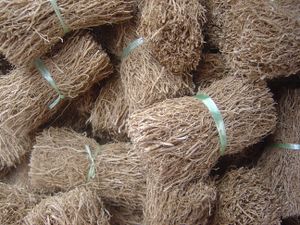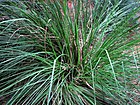Note: This is a project under development. The articles on this wiki are just being initiated and broadly incomplete. You can Help creating new pages.
Difference between revisions of "Chrysopogon zizanioides - Vetiver"
(→References) |
(→List of Ayurvedic medicine in which the herb is used) |
||
| (5 intermediate revisions by the same user not shown) | |||
| Line 1: | Line 1: | ||
[[File:Vetiveria zizanoides dsc07810.jpg|thumb|right|''vetiver'']] | [[File:Vetiveria zizanoides dsc07810.jpg|thumb|right|''vetiver'']] | ||
| − | '''Vetiver''' is a perennial bunchgrass of the Poaceae family. It is native to India. In western and northern India | + | '''Vetiver''' is a perennial bunchgrass of the Poaceae family. It is native to India. In western and northern India it is popularly known as khus. |
==Uses== | ==Uses== | ||
{{Uses|Nerve problems}}, {{Uses|Stress}}, {{Uses|Emotional traumas}}, {{Uses|Lice}}, {{Uses|Repelling insects}}, {{Uses|Insomnia}}, {{Uses|Muscle pain}}, {{Uses|Joint pain}}, {{Uses|Sore throats}} | {{Uses|Nerve problems}}, {{Uses|Stress}}, {{Uses|Emotional traumas}}, {{Uses|Lice}}, {{Uses|Repelling insects}}, {{Uses|Insomnia}}, {{Uses|Muscle pain}}, {{Uses|Joint pain}}, {{Uses|Sore throats}} | ||
| Line 11: | Line 11: | ||
==Common names== | ==Common names== | ||
| − | {{Common names|kn=Lavancha|ml=Ramaccham, Ramachehamver|sa=Abhaya, Amrinata|ta= | + | {{Common names|kn=Lavancha|ml=Ramaccham, Ramachehamver|sa=Abhaya, Amrinata|ta=Lamichamver, Vattiver|te=Ayurugaddiveru, Kuruveeru|hi=Balah|en=Vetiver}} |
==Properties== | ==Properties== | ||
| Line 37: | Line 37: | ||
===Flower=== | ===Flower=== | ||
| − | {{Flower|Unisexual|2-4cm long| | + | {{Flower|Unisexual|2-4cm long|Purple|1|The plant bears small brown-purple flowers in long spikes}} |
===Fruit=== | ===Fruit=== | ||
| Line 45: | Line 45: | ||
==List of Ayurvedic medicine in which the herb is used== | ==List of Ayurvedic medicine in which the herb is used== | ||
| − | * [[ | + | * [[Ushiraasava]], [[Chandanasava]], [[Shadanga paniya]], [[Gopanganad kashayam]], [[Nisosiradi oil]] |
| − | |||
| − | |||
| − | |||
<ref name="Ayurvedic preparations"/> | <ref name="Ayurvedic preparations"/> | ||
| Line 74: | Line 71: | ||
<references> | <references> | ||
| − | <ref name="chemical composition">[https://www.herbsia.com/2017/11/vetiveria-zizanioides-chemical.html | + | <ref name="chemical composition">[https://www.herbsia.com/2017/11/vetiveria-zizanioides-chemical.html Chemical Constituents]</ref> |
| − | <ref name="Leaf">[https://www.britannica.com/plant/vetiver | + | <ref name="Leaf">[https://www.britannica.com/plant/vetiver Plant description]</ref> |
| − | <ref name="Ayurvedic preparations">[https://www.britannica.com/plant/vetiver | + | <ref name="Ayurvedic preparations">[https://www.britannica.com/plant/vetiver Ayurvedic preparations]</ref> |
| − | <ref name="How to plant/cultivate">[http://agriinfo.in/default.aspx?page=topic&superid=2&topicid=1403 | + | <ref name="How to plant/cultivate">[http://agriinfo.in/default.aspx?page=topic&superid=2&topicid=1403 Planting]</ref> |
</references> | </references> | ||
Latest revision as of 15:42, 8 March 2023
Vetiver is a perennial bunchgrass of the Poaceae family. It is native to India. In western and northern India it is popularly known as khus.
Contents
- 1 Uses
- 2 Parts Used
- 3 Chemical Composition
- 4 Common names
- 5 Properties
- 6 Habit
- 7 Identification
- 8 List of Ayurvedic medicine in which the herb is used
- 9 Where to get the saplings
- 10 Mode of Propagation
- 11 How to plant/cultivate
- 12 Commonly seen growing in areas
- 13 Photo Gallery
- 14 References
- 15 External Links
Uses
Nerve problems, Stress, Emotional traumas, Lice, Repelling insects, Insomnia, Muscle pain, Joint pain, Sore throats
Parts Used
Chemical Composition
Benzoic acid, the molecular formula is C6H5COOH, is a colorless crystalline solid and a simple aromatic carboxylic acid[1]
Common names
| Language | Common name |
|---|---|
| Kannada | Lavancha |
| Hindi | Balah |
| Malayalam | Ramaccham, Ramachehamver |
| Tamil | Lamichamver, Vattiver |
| Telugu | Ayurugaddiveru, Kuruveeru |
| Marathi | NA |
| Gujarathi | NA |
| Punjabi | NA |
| Kashmiri | NA |
| Sanskrit | Abhaya, Amrinata |
| English | Vetiver |
Properties
Reference: Dravya - Substance, Rasa - Taste, Guna - Qualities, Veerya - Potency, Vipaka - Post-digesion effect, Karma - Pharmacological activity, Prabhava - Therepeutics.
Dravya
Rasa
Tikta (Bitter), Kashaya (Astringent)
Guna
Laghu (Light), Ruksha (Dry), Tikshna (Sharp)
Veerya
Ushna (Hot)
Vipaka
Katu (Pungent)
Karma
Kapha, Vata
Prabhava
Habit
Identification
Leaf
| Kind | Shape | Feature |
|---|---|---|
| Simple | The thin leaves and stems are erect and rigid |
Flower
| Type | Size | Color and composition | Stamen | More information |
|---|---|---|---|---|
| Unisexual | 2-4cm long | Purple | 1 | The plant bears small brown-purple flowers in long spikes |
Fruit
| Type | Size | Mass | Appearance | Seeds | More information |
|---|---|---|---|---|---|
| 7–10 mm | Clearly grooved lengthwise, Lowest hooked hairs aligned towards crown | - | - | {{{6}}} |
Other features
List of Ayurvedic medicine in which the herb is used
Where to get the saplings
Mode of Propagation
How to plant/cultivate
Conical ridges, 30-38 cm high and 48 cm apart are made at the summit and the slips planted 23 cm apart on the summit.[4]
Commonly seen growing in areas
Tall grasslands, Meadows, Borders of forests and fields.
Photo Gallery
References
External Links
- Ayurvedic Herbs known to be helpful to treat Nerve problems
- Ayurvedic Herbs known to be helpful to treat Stress
- Ayurvedic Herbs known to be helpful to treat Emotional traumas
- Ayurvedic Herbs known to be helpful to treat Lice
- Ayurvedic Herbs known to be helpful to treat Repelling insects
- Ayurvedic Herbs known to be helpful to treat Insomnia
- Ayurvedic Herbs known to be helpful to treat Muscle pain
- Ayurvedic Herbs known to be helpful to treat Joint pain
- Ayurvedic Herbs known to be helpful to treat Sore throats
- Herbs with Leaves used in medicine
- Herbs with common name in Kannada
- Herbs with common name in Hindi
- Herbs with common name in Malayalam
- Herbs with common name in Tamil
- Herbs with common name in Telugu
- Herbs with common name in Sanskrit
- Herbs with common name in English
- Habit - Herb
- Index of Plants which can be propagated by Seeds
- Index of Plants which can be propagated by Cuttings
- Herbs that are commonly seen in the region of Tall grasslands
- Herbs that are commonly seen in the region of Meadows
- Herbs that are commonly seen in the region of Borders of forests and fields
- Herbs
- Poaceae





